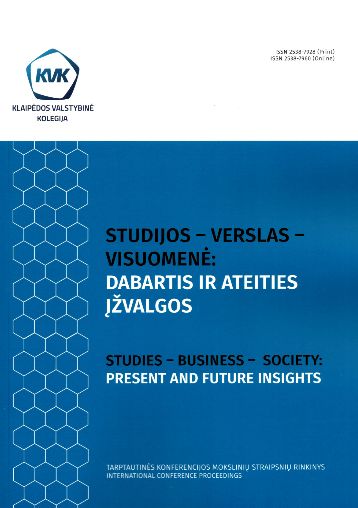ADVANTAGES AND INCREASING THE EFFECTIVENESS OF ENTREPRENEURSHIP EDUCATION THROUGH A BLENDED LEARNING APPROACH IN PRACTICE ENTERPRISES
DOI:
https://doi.org/10.52320/svv.v1iVII.244Keywords:
entrepreneurship, practice enterprise, bleanded learning methodAbstract
Blended education is becoming an increasingly important phenomenon in the process of today’s educational system changing and creates opportunities for the intellect multidimensionality to manifest itself, while creating the prerequisites for all subjects to become a connecting link in education. The Association of Lithuanian Practice Enterprises sees that the main link in such education could be practice enterprises operating in Lithuania, but it is not assessed which didactic tools and mixed teaching methods could be applied most often and are the most acceptable in this activity.
The research was commissioned by the Association LIBA. The LIBA Association is a non-profit organization that unites Lithuanian institutions in which practice enterprises operate, as well as the heads of practice enterprises, coordinators, educators, interns, working in them, other natural and legal persons who carry out the activities of the association and (or) approve of it.
The aim of LIBA is to gather various institutions with practice enterprises, practice enterprise trainers, teachers, coordinators, trainees who are or were working with practice enterprise concept, social partners, other natural or legal persons on purpose to improve practice enterprise model according to target groups (trainers, trainees) needs; stimulate qualitative and quantitative practice enterprise network development; organize and moderate mutually beneficial partnership between Association members and all interested organizations.
The aim of the research is to reveal the possibilities of entrepreneurship education in practice enterprises using a blended learning method.
Research methods: the analysis of scientific literature, quantitative survey, statistical data analysis.
The process of research. Before the start of the research, it was decided to interview the heads of practice enterprises and the lecturers / teachers working in those study programs where there are functioning practice enterprises. It was decided to interview about 30 managers of Lithuanian practice enterprises, or at least 70 per cent managers working in Lithuanian network of practice enterprises. Currently there are 40 practice enterprises operating in Lithuania, 28 of which comprise 70 per cent; and twice as many lecturers/teachers working in study programs where there are functioning practice enterprises. The research took place in 2019-2021. In 2019, a survey questionnaire, a survey methodology, and a survey calendar were prepared. As part of the research, an electronic survey questionnaire was created, and an invitation was sent – a request to participate in the study. The survey was conducted between January and June 2020. However , in the absence of a sufficient number of respondents, it was extended between September and November 2020. During January-March 2021, the results of the research were analysed, and the research report was prepared.
The questionnaire consisted of demographic questions and statements prepared to evaluate the advantages and efficiency of blended learning in the development of entrepreneurship in practice enterprises.
Analysis of the research data: The graphical analysis was performed using the data collected by "Anketa.lt" and the Ms Excel spreadsheet.
Based on the analysis of scientific literature, it was revealed that the blended learning method combines traditional learning and virtual learning methods and promotes student autonomy, helps to individualize the learning process, promotes cooperation between students and teachers. With this method, it is easy to combine classical and active learning methods, use various information technology tools that enrich learning activities and methods and promote the continuous improvement of information technology competencies.
The assessment of the application of a blended teaching method in practice enterprise activities revealed such advantages as the constant development of new information technology competencies, the increase in the motivation and personal responsibility of the practice enterprise trainee for learning results, the creation of a common database and a community of learners.
In identifying how the application of a blended approach would increase the effectiveness of entrepreneurship education in practice enterprises, it became clear that it increases through the differentiation and individualization of activities, the application of the flexibility of the mixed approach, the increase in the motivation and responsibility of the IB trainee for learning outcomes, the expansion of the learning space and time, the combination of the advantages of traditional learning and e-learning, and the provision of greater opportunities for cooperation. It is therefore proposed to extend the use of a blended teaching approach in the development of entrepreneurial skills in practice enterprises, organizing meetings, conducting negotiations, consultations with social partners, promoting closer communication between all practice enterprises.
Downloads
Published
How to Cite
Issue
Section
License
Copyright (c) 2022 Asta Pancerovienė, Adelė Stonienė, Vida Žvinienė

This work is licensed under a Creative Commons Attribution 4.0 International License.
Individual articles are published Open Access under the Creative Commons Licence CC-BY 4.0, which permits unrestricted use, distribution, and reproduction in any medium, provided the original author and source are credited. Authors retain copyright in their articles, but grant Klaipėdos valstybinė kolegija the right of the first publication.

